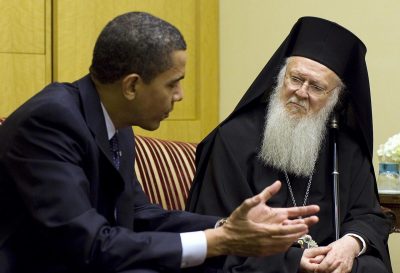Patriarch Bartholomew Is a Proxy of US Interests Against Russia

All Global Research articles can be read in 51 languages by activating the “Translate Website” drop down menu on the top banner of our home page (Desktop version).
Visit and follow us on Instagram at @crg_globalresearch.
***
At the “World Orthodoxy: Primacy and Sobornost in the Light of the Orthodox Doctrine” conference on September 16, a joint presentation was made by Metropolitan Nikifor of Kykkos and Tylliria and Metropolitan Isaiah of Tamassos and Orini of the Church of Cyprus. The joint presentation given at the Cathedral of Christ the Savior in Moscow made a scathing attack against the decision of many Orthodox Churches to recognize the independence of the Orthodox Church of Ukraine from the Russian Orthodox Church, also known as the Moscow Patriarchate. Their presentation fully contextualized how divided the Christian Orthodox World is following the 2018 schism.
The Orthodox Catholic Church, more commonly known as the Eastern Orthodox Church, is in a state of crisis and division because of the Ukrainian church issue. The division emerged due to the arbitrary and anti-canonical granting of autocephaly, or independence from external patriarchal authority, to the schismatic structures of the Orthodox Church of Ukraine by the Ecumenical Patriarchate of Constantinople, headed by Archbishop Bartholomew I of Constantinople. This was against the will of the Russian Orthodox Church which for centuries held jurisdiction over Ukraine.
According to the Metropolitan’s presentation, some forces in ecumenical Orthodoxy are “using the difficult situation that has developed in Ukraine” and are “trying to break the unity of the Orthodox Church. And they succeeded in something.” They cited as an example “the sinful and inexplicable visit of the Patriarch of Constantinople to Kiev and his concelebration with the schismatics.”
Patriarch Bartholomew visited Ukraine on August 20-24 and celebrated the 30th anniversary of the country’s independence from the Soviet Union. During his visit, he served with schismatics from the Orthodox Church of Ukraine and met with President Volodymyr Zelensky and other politicians.
Istanbul-based Patriarch Bartholomew is considered “first among equals” as he heads the Ecumenical Patriarchate of Constantinople, otherwise known as the Mother Church. Because of this status, he holds a certain prestige not afforded to other Patriarchs, something that has been a source of conflict between Constantinople and Moscow for centuries, especially after the latter attempted to take the mantle of “Third Rome.”
Although the immediate source of disagreement between the two Patriarchates is based on different interpretations of the 1686 Letter of Issue that had given permission to the Patriarch of Moscow to ordain the Metropolitan of Kyiv, this rivalry is based in the struggle of ecclesiastical supremacy.
With the Ottomans capturing Constantinople in 1453, the Constantinople Patriarchate became the sole institution to survive the more than 1,500-year existence of the Roman Empire before its final destruction, giving it a privileged stature over other churches. However, after the Fall of Constantinople and the end of the Eastern Roman Empire (commonly known as the Byzantine Empire), the Moscow Patriarchate reigned supremacy as it was not under Muslim rule. Under this context, the two churches have competed for territory and influence for centuries.
Bartholomew’s decision has significant implications. He, a Turkish citizen as all of Constantinople’s Patriarchs must be, is scheduled to meet U.S. President Joe Biden at the White House on October 23. This will mean that the Patriarch will have met with Biden at the White House before Turkish President Recep Tayyip Erdoğan, not only signalling his close relationship with the U.S., but also the current distance between Washington and Ankara.
The schism between Constantinople and Moscow is obviously political in nature as there is no underlying theological or doctrinal issue at stake. Rather, the schism brings to question the nature of Ukrainian identity. In this way, Bartholomew, who has fostered a very close relationship with the U.S., so-much-so that then Secretary of State Mike Pompeo visited him and not Turkish government officials in November 2020, is encouraging a permanent Ukrainian separation from Russia by revoking a centuries old agreement.
Effectively, Bartholomew mirrored Kiev’s attempts to be absorbed by the west and split from Moscow by granting Ukraine spiritual independence, even if it was schismatic. In this way, Bartholomew made himself a proxy of U.S. interests against Russia. In the context of the Constantinople-Moscow rivalry, Bartholomew has hedged his bets in backing the U.S. against Russia for the perceived benefits it could bring to the Constantinople Patriarchate.
Although the Moscow Patriarchate has lost control of thousands of churches due to the granting of autocephaly to the Ukrainian Orthodox Church, it still remains by far the largest and wealthiest Orthodox church. However, Russia is already under an immense pressure campaign from the West – diplomatically, economically and militarily. What Bartholomew has effectively done is open a new pressure front against Russia – spiritually.
This could have long-term ramifications though, not only because of the current schism, but because new schisms could also emerge. For example, what could stop the unrecognized Macedonian Orthodox Church – Ohrid Archbishopric from achieving recognized autocephaly, especially since it already unilaterally announced its autocephaly from the Serbian Orthodox Church in 1967?
Bartholomew has essentially established a pretext that can lead to further divisions and schisms in the already divided Christian Orthodox World. He is also blatantly acting as an agent of pressure against Russia, just on a less obvious and often overlooked front. Given these conditions, even bishops and metropolitans within church structures that support the autocephaly of the Ukrainian Orthodox Church are beginning to speak out in a strong way against the actions of Constantinople’s Patriarch. Despite this, it is unlikely to lead to Bartholomew reversing his decision.
*
Note to readers: Please click the share buttons above or below. Follow us on Instagram, @crg_globalresearch. Forward this article to your email lists. Crosspost on your blog site, internet forums. etc.
Paul Antonopoulos is an independent geopolitical analyst.
Featured image: United States President Barack Obama meets with Bartholomew I (Public Domain)

